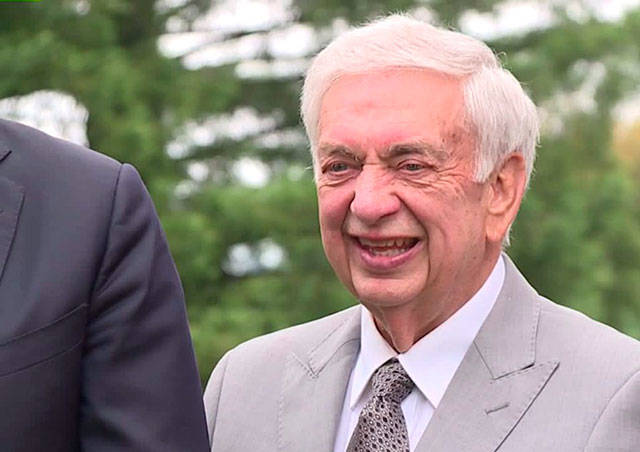There was nothing pretentious about Mike Lowry. What you saw is what you got.
Lowry was one of Washington’s most colorful governors. He served one term from 1993 to 1997. He died on May 1 at age 78.
There was nothing subtle about Mike Lowry. He was not afraid to mix it up publicly nor put his political future on the line when he believed in a cause.
For example, in 1993 Lowry pushed legislation dramatically reforming our state’s health care laws. He and his Democrat colleagues jammed a bill through the Legislature requiring all employers to provide a state-mandated set of health insurance benefits for all workers.
He became an instant hero with the Clintons who were pushing a similar plan for the country. Lowry was invited for an overnight stay at the White House to help launch the national effort. The new Washington law was to be the model for “Hillary Care.”
Then a year later, Lowry drew Clinton’s ire for vociferously opposing the president’s welfare reforms. “I went from the penthouse to the doghouse overnight,” Lowry jokingly said.
To Lowry, politics was a battle of ideas and ideals. It isn’t personal, it is the way our system works. He believed an adversary today may be an ally tomorrow.
When fighting for his health reforms, Lowry exempted labor unions because their insurance benefits were better than the state would mandate.
At the time, I was president of the state’s oldest and largest business organization and many of our members who were not unionized also had health insurance plans better than the state required. We lobbied for an amendment allowing those businesses to also be exempt from the bill.
Lowry blew his stack and called demanding: “What the hell you doing killing my bill? Be in my office first thing in the morning and, by the way, take that damn banner down from your building before you come to my office!”
We put a huge banner on the side of our building saying” “It’s the Economy, Don’t Kill It!” You couldn’t miss it. It was not taken down.
The next morning, Lowry cooled down and asked: “You mean to tell me that your members can’t afford a latte a day for worker health care?”
“Governor, you missed the point,” I replied. “It is about better coverage for workers at companies already with insurance. But what you require for small business is unaffordable.”
We lost that battle, but two years later when Washington’s reforms failed to receive Congressional approval, Lowry worked with a bipartisan group of legislators to enact new health reforms allowing small businesses to buy affordable health insurance.
At last count, about a half million small business employees now have health insurance thanks to Lowry’s leadership. Nearly half of them had no previous coverage.
Lowry was branded as one who never saw a tax he didn’t like. That wasn’t fair.
For example, a bipartisan group of lawmakers ran property tax legislation which increase the burden on business. Homeowners may get some relief, but commercial and industrial property owners would see their property taxes ratchet up. Technically, it was called a “spilt-roll.”
We pointed out that Minnesota’s split-roll hampered business development in that state. It would do the same in Washington. Lowery agreed and killed the bill.
In retirement, Lowry loved driving his pickup truck and spent much of his time helping farm workers find affordable housing.
The epilogue is Mike Lowry was a farm kid from Eastern Washington who never lost his rough edges, sense of fairness, humor or compassion. He is definitely one for the ages.
Don C. Brunell is a business analyst, writer and columnist. He retired as president of the Association of Washington Business, the state’s oldest and largest business organization, and now lives in Vancouver. He can be contacted at theBrunells@msn.com.
Talk to us
Please share your story tips by emailing editor@kentreporter.com.
To share your opinion for publication, submit a letter through our website https://www.kentreporter.com/submit-letter/. Include your name, address and daytime phone number. (We’ll only publish your name and hometown.) Please keep letters to 300 words or less.

